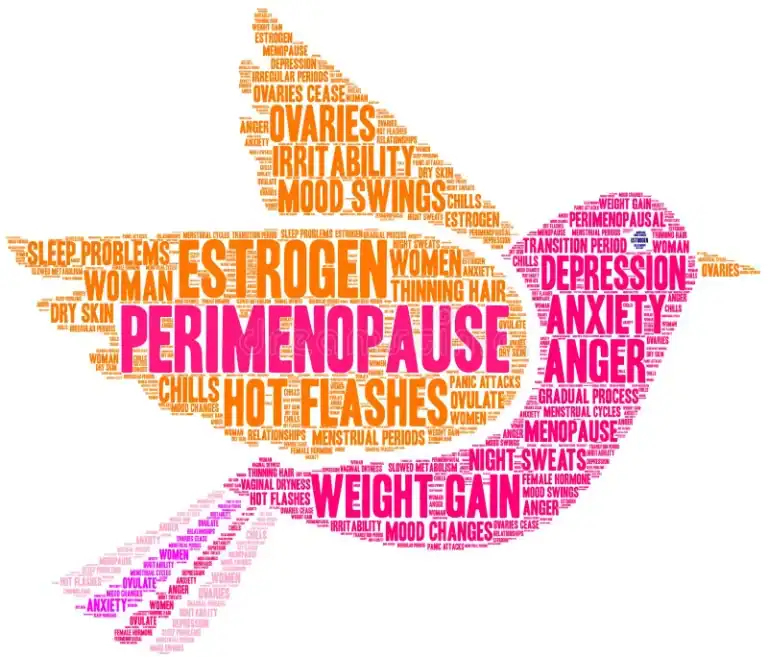Perimenopause: The Struggle is Real


Perimenopause is a natural part of life, but that doesn’t mean it’s easy. For many women, it can feel like an uphill climb filled with unpredictable changes. The good news? You don’t have to face it alone. Understanding what’s happening in your body—and knowing what options are available—can help you navigate this transition with confidence.
What is Perimenopause?
Perimenopause is the transitional stage before menopause, the point when your periods stop completely (after 12 months without a cycle). It usually begins in the early to mid-40s, but may start earlier or later. On average, it lasts 4–8 years, though the timeline varies.
Symptoms: More Than Just Hot Flashes
Hormone fluctuations—especially in estrogen and progesterone—cause a wide range of symptoms.
Classic Symptoms
- Hot flashes and night sweats
- Irregular periods (shorter, longer, heavier, or lighter)
- Vaginal dryness and discomfort during intimacy
- Trouble sleeping
Subtle or Overlooked Symptoms
- Mood swings, irritability, or anxiety
- Brain fog and difficulty concentrating
- Fatigue and low energy
- Hair or skin changes (thinning, dryness)
- Weight gain, especially around the midsection
- Joint aches or new onset of migraines

Metabolic and Health Changes
Declining estrogen doesn’t just affect cycles—it also impacts long-term health.
- Slower metabolism → weight changes and belly fat are common.
- Insulin resistance → blood sugar levels may rise.
- Cholesterol changes → LDL and triglycerides can increase, raising heart risk.
- Bone health → bone density begins to decline, increasing osteoporosis risk.
- Muscle loss → contributes to fatigue and reduced strength.

Lab and Diagnostic Insights
There is no single lab test that confirms perimenopause. Diagnosis is mainly based on age, symptoms, and cycle changes. Still, certain labs may be checked:
- FSH and estradiol: May fluctuate, but can suggest perimenopause.
- Progesterone: Often decreases due to less frequent ovulation.
- TSH and prolactin: To rule out thyroid or other conditions with similar symptoms.
- Cholesterol and glucose/A1c: To monitor metabolic shifts.
- DEXA scan: Recommended if risk factors for osteoporosis are present.
Can Perimenopause Be Treated?
There’s no treatment to stop perimenopause—it’s a natural stage of life. But symptoms can absolutely be managed to improve comfort and quality of life. Some women do well with lifestyle changes alone, while others benefit from medication.
Management and Treatment Options
Hormone-Based Therapies
- Menopausal Hormone Therapy (MHT/HT): The most effective treatment for hot flashes, night sweats, and vaginal dryness. Safe for healthy women under 60 who are within 10 years of menopause onset.
- Particularly important for women with early or premature menopause (before 45), to protect heart and bone health until the average menopause age (~51).
- Low-dose birth control pills: Can regulate cycles, reduce hot flashes, and improve mood swings in younger perimenopausal women.
- Vaginal estrogen: Local creams, tablets, or rings can ease dryness and pain during sex without raising systemic hormone levels.
Non-Hormonal Medications
For women who cannot or prefer not to take hormones:
- Antidepressants (SSRIs/SNRIs): Help with hot flashes, mood swings, anxiety, or depression.
- Paroxetine (Brisdelle): FDA-approved for hot flashes.
- Fezolinetant (Veozah): A newer FDA-approved, non-hormonal treatment for moderate to severe hot flashes.
- Gabapentin: Can reduce hot flashes, especially at night.
- Oxybutynin: Used for bladder issues but also helps hot flashes.
- Vaginal creams/lubricants: Over-the-counter and prescription options relieve dryness and discomfort.
Lifestyle and Complementary Approaches
Many women find symptom relief through daily habits:
- Balanced diet: Focus on fruits, vegetables, whole grains, lean protein, and calcium-rich foods. Limit sugar, alcohol, caffeine, and spicy foods.
- Exercise: Weight-bearing and strength training improve bone health, metabolism, and mood.
- Layering and cooling: Dress in layers, use fans, and keep the bedroom cool for hot flashes.
- Better sleep hygiene: Limit screens before bed, keep a consistent schedule, and wind down with calming routines.
- Stress management: Meditation, yoga, breathing exercises, CBT, or hypnosis can ease symptoms.
- Quit smoking: Smoking worsens symptoms and can lead to earlier menopause.
What Makes Perimenopause Worse?
Everyone is different, but common factors that worsen symptoms include:
- Diets high in sugar and unhealthy fats
- Sedentary lifestyle or lack of regular exercise
- Tobacco use
- Excess alcohol and caffeine
Health Outlook and Risks
Perimenopause leads directly into menopause, which carries long-term health considerations due to lower estrogen levels:
- Osteoporosis: Increased bone fragility and fracture risk.
- Cardiovascular disease: Higher risk of heart disease and vascular conditions.
- Metabolic changes: More likely to experience weight gain, diabetes, and cholesterol shifts.
Your doctor may recommend calcium, vitamin D, multivitamins, or bone-strengthening exercise to protect your long-term health.
Fertility and Pregnancy in Perimenopause
Yes—you can still get pregnant during perimenopause. Ovulation is unpredictable, but possible until menopause is complete. If pregnancy is not desired, use birth control until your provider confirms it’s safe to stop.
When to See a Doctor
Reach out to your healthcare provider if:
- Symptoms are affecting your daily life.
- Bleeding is unusually heavy or prolonged.
- You’re considering hormone therapy and want to weigh risks and benefits.
- You have a history of early or premature menopause.
Helpful questions to ask your provider include:
- Are these symptoms definitely perimenopause?
- What treatment options are best for me?
- Should I take vitamins, supplements, or start medications?
- Are there tests I need to check my bone or heart health?
The Bottom Line
Perimenopause is a natural stage, but it doesn’t mean you have to suffer in silence. From lifestyle adjustments to FDA-approved treatments, there are many ways to ease the struggle and protect your long-term health.
At Bluebonnet Diabetes & Endocrinology, we are here to guide you through this transition with personalized care and evidence-based treatments.
🌿 If you’re experiencing symptoms of perimenopause, schedule a consultation today to explore your options.
